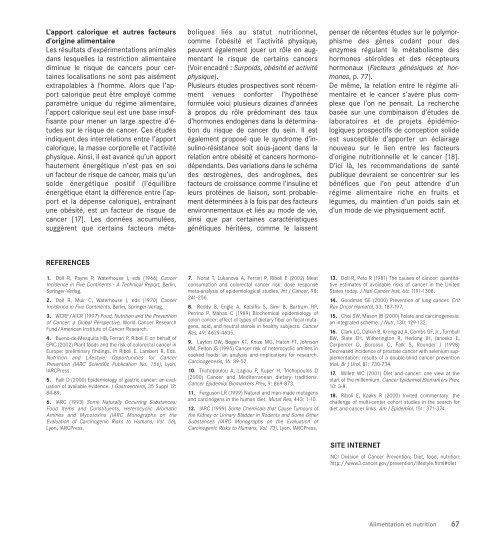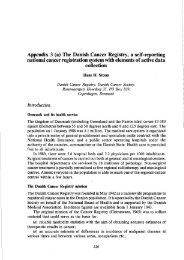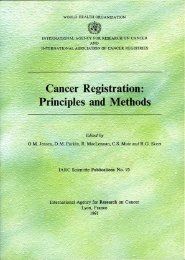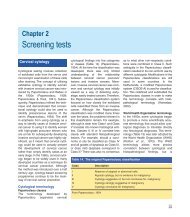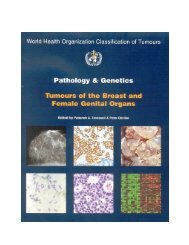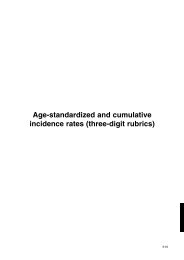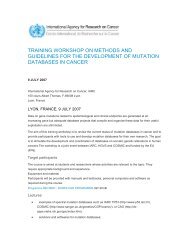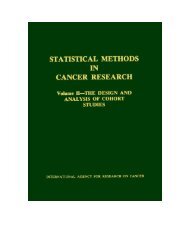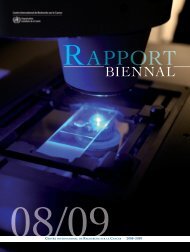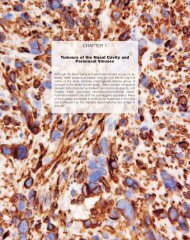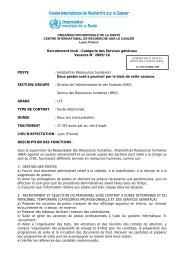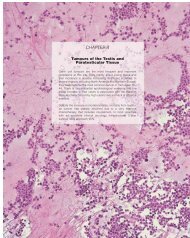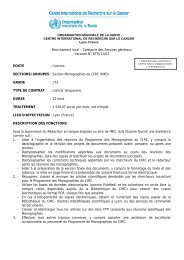Le cancer, un fardeau mondial - IARC
Le cancer, un fardeau mondial - IARC
Le cancer, un fardeau mondial - IARC
You also want an ePaper? Increase the reach of your titles
YUMPU automatically turns print PDFs into web optimized ePapers that Google loves.
L’apport calorique et autres facteurs<br />
d’origine alimentaire<br />
<strong>Le</strong>s résultats d’expérimentations animales<br />
dans lesquelles la restriction alimentaire<br />
diminue le risque de <strong>cancer</strong>s pour certaines<br />
localisations ne sont pas aisément<br />
extrapolables à l’homme. Alors que l’apport<br />
calorique peut être employé comme<br />
paramètre <strong>un</strong>ique du régime alimentaire,<br />
l’apport calorique seul est <strong>un</strong>e base insuffisante<br />
pour mener <strong>un</strong> large spectre d’études<br />
sur le risque de <strong>cancer</strong>. Ces études<br />
indiquent des interrelations entre l’apport<br />
calorique, la masse corporelle et l’activité<br />
physique. Ainsi, il est avancé qu’<strong>un</strong> apport<br />
hautement énergétique n’est pas en soi<br />
<strong>un</strong> facteur de risque de <strong>cancer</strong>, mais qu’<strong>un</strong><br />
solde énergétique positif (l’équilibre<br />
énergétique étant la différence entre l’apport<br />
et la dépense calorique), entraînant<br />
<strong>un</strong>e obésité, est <strong>un</strong> facteur de risque de<br />
<strong>cancer</strong> [17]. <strong>Le</strong>s données accumulées,<br />
suggèrent que certains facteurs métaboliques<br />
liés au statut nutritionnel,<br />
comme l’obésité et l’activité physique,<br />
peuvent également jouer <strong>un</strong> rôle en augmentant<br />
le risque de certains <strong>cancer</strong>s<br />
(Voir encadré : Surpoids, obésité et activité<br />
physique).<br />
Plusieurs études prospectives sont récemment<br />
venues conforter l’hypothèse<br />
formulée voici plusieurs dizaines d’années<br />
à propos du rôle prédominant des taux<br />
d’hormones endogènes dans la détermination<br />
du risque de <strong>cancer</strong> du sein. Il est<br />
également proposé que le syndrome d’insulino-résistance<br />
soit sous-jacent dans la<br />
relation entre obésité et <strong>cancer</strong>s hormonodépendants.<br />
Des variations dans le schéma<br />
des œstrogènes, des androgènes, des<br />
facteurs de croissance comme l’insuline et<br />
leurs protéines de liaison, sont probablement<br />
déterminées à la fois par des facteurs<br />
environnementaux et liés au mode de vie,<br />
ainsi que par certaines caractéristiques<br />
génétiques héritées, comme le laissent<br />
penser de récentes études sur le polymorphisme<br />
des gènes codant pour des<br />
enzymes régulant le métabolisme des<br />
hormones stéroïdes et des récepteurs<br />
hormonaux (Facteurs génésiques et hormones,<br />
p. 77).<br />
De même, la relation entre le régime alimentaire<br />
et le <strong>cancer</strong> s’avère plus complexe<br />
que l’on ne pensait. La recherche<br />
basée sur <strong>un</strong>e combinaison d’études de<br />
laboratoires et de projets épidémiologiques<br />
prospectifs de conception solide<br />
est susceptible d’apporter <strong>un</strong> éclairage<br />
nouveau sur le lien entre les facteurs<br />
d’origine nutritionnelle et le <strong>cancer</strong> [18].<br />
D’ici là, les recommandations de santé<br />
publique devraient se concentrer sur les<br />
bénéfices que l’on peut attendre d’<strong>un</strong><br />
régime alimentaire riche en fruits et<br />
légumes, du maintien d’<strong>un</strong> poids sain et<br />
d’<strong>un</strong> mode de vie physiquement actif.<br />
REFERENCES<br />
1. Doll R, Payne P, Waterhouse J, eds (1966) Cancer<br />
Incidence in Five Continents - A Technical Report, Berlin,<br />
Springer-Verlag.<br />
2. Doll R, Muir C, Waterhouse J, eds (1970) Cancer<br />
Incidence in Five Continents, Berlin, Springer-Verlag.<br />
3. WCRF/AICR (1997) Food, Nutrition and the Prevention<br />
of Cancer: a Global Perspective, World Cancer Research<br />
F<strong>un</strong>d/American Institute of Cancer Research.<br />
4. Bueno-de-Mesquita HB, Ferrari P, Riboli E on behalf of<br />
EPIC (2002) Plant foods and the risk of colorectal <strong>cancer</strong> in<br />
Europe: preliminary findings. In Riboli E, Lambert R, Eds.<br />
Nutrition and Lifestyle: Opport<strong>un</strong>ities for Cancer<br />
Prevention (<strong>IARC</strong> Scientific Publication No. 156), Lyon,<br />
<strong>IARC</strong>Press.<br />
5. Palli D (2000) Epidemiology of gastric <strong>cancer</strong>: an evaluation<br />
of available evidence. J Gastroenterol, 35 Suppl 12:<br />
84-89.<br />
6. <strong>IARC</strong> (1993) Some Naturally Occurring Substances:<br />
Food Items and Constituents, Heterocyclic Aromatic<br />
Amines and Mycotoxins (<strong>IARC</strong> Monographs on the<br />
Evaluation of Carcinogenic Risks to Humans, Vol. 56),<br />
Lyon, <strong>IARC</strong>Press.<br />
7. Norat T, Lukanova A, Ferrari P, Riboli E (2002) Meat<br />
consumption and colorectal <strong>cancer</strong> risk: dose response<br />
meta-analysis of epidemiological studies. Int J Cancer, 98:<br />
241-256.<br />
8. Reddy B, Engle A, Katsifis S, Simi B, Bartram HP,<br />
Perrino P, Mahan C (1989) Biochemical epidemiology of<br />
colon <strong>cancer</strong>: effect of types of dietary fiber on fecal mutagens,<br />
acid, and neutral sterols in healthy subjects. Cancer<br />
Res, 49: 4629-4635.<br />
9. Layton DW, Bogen KT, Knize MG, Hatch FT, Johnson<br />
VM, Felton JS (1995) Cancer risk of heterocyclic amines in<br />
cooked foods: an analysis and implications for research.<br />
Carcinogenesis, 16: 39-52.<br />
10. Trichopoulou A, Lagiou P, Kuper H, Trichopoulos D<br />
(2000) Cancer and Mediterranean dietary traditions.<br />
Cancer Epidemiol Biomarkers Prev, 9: 869-873.<br />
11. Ferguson LR (1999) Natural and man-made mutagens<br />
and carcinogens in the human diet. Mutat Res, 443: 1-10.<br />
12. <strong>IARC</strong> (1999) Some Chemicals that Cause Tumours of<br />
the Kidney or Urinary Bladder in Rodents and Some Other<br />
Substances (<strong>IARC</strong> Monographs on the Evaluation of<br />
Carcinogenic Risks to Humans, Vol. 73), Lyon, <strong>IARC</strong>Press.<br />
13. Doll R, Peto R (1981) The causes of <strong>cancer</strong>: quantitative<br />
estimates of avoidable risks of <strong>cancer</strong> in the United<br />
States today. J Natl Cancer Inst, 66: 1191-1308.<br />
14. Goodman GE (2000) Prevention of l<strong>un</strong>g <strong>cancer</strong>. Crit<br />
Rev Oncol Hematol, 33: 187-197.<br />
15. Choi SW, Mason JB (2000) Folate and carcinogenesis:<br />
an integrated scheme. J Nutr, 130: 129-132.<br />
16. Clark LC, Dalkin B, Krongrad A, Combs GF, Jr., Turnbull<br />
BW, Slate EH, Witherington R, Herlong JH, Janosko E,<br />
Carpenter D, Borosso C, Falk S, Ro<strong>un</strong>der J (1998)<br />
Decreased incidence of prostate <strong>cancer</strong> with selenium supplementation:<br />
results of a double-blind <strong>cancer</strong> prevention<br />
trial. Br J Urol, 81: 730-734.<br />
17. Willett WC (2001) Diet and <strong>cancer</strong>: one view at the<br />
start of the millennium. Cancer Epidemiol Biomarkers Prev,<br />
10: 3-8.<br />
18. Riboli E, Kaaks R (2000) Invited commentary: the<br />
challenge of multi-center cohort studies in the search for<br />
diet and <strong>cancer</strong> links. Am J Epidemiol, 151: 371-374.<br />
SITE INTERNET<br />
NCI Division of Cancer Prevention: Diet, food, nutrition:<br />
http://www3.<strong>cancer</strong>.gov/prevention/lifestyle.html#diet<br />
Alimentation et nutrition<br />
67


